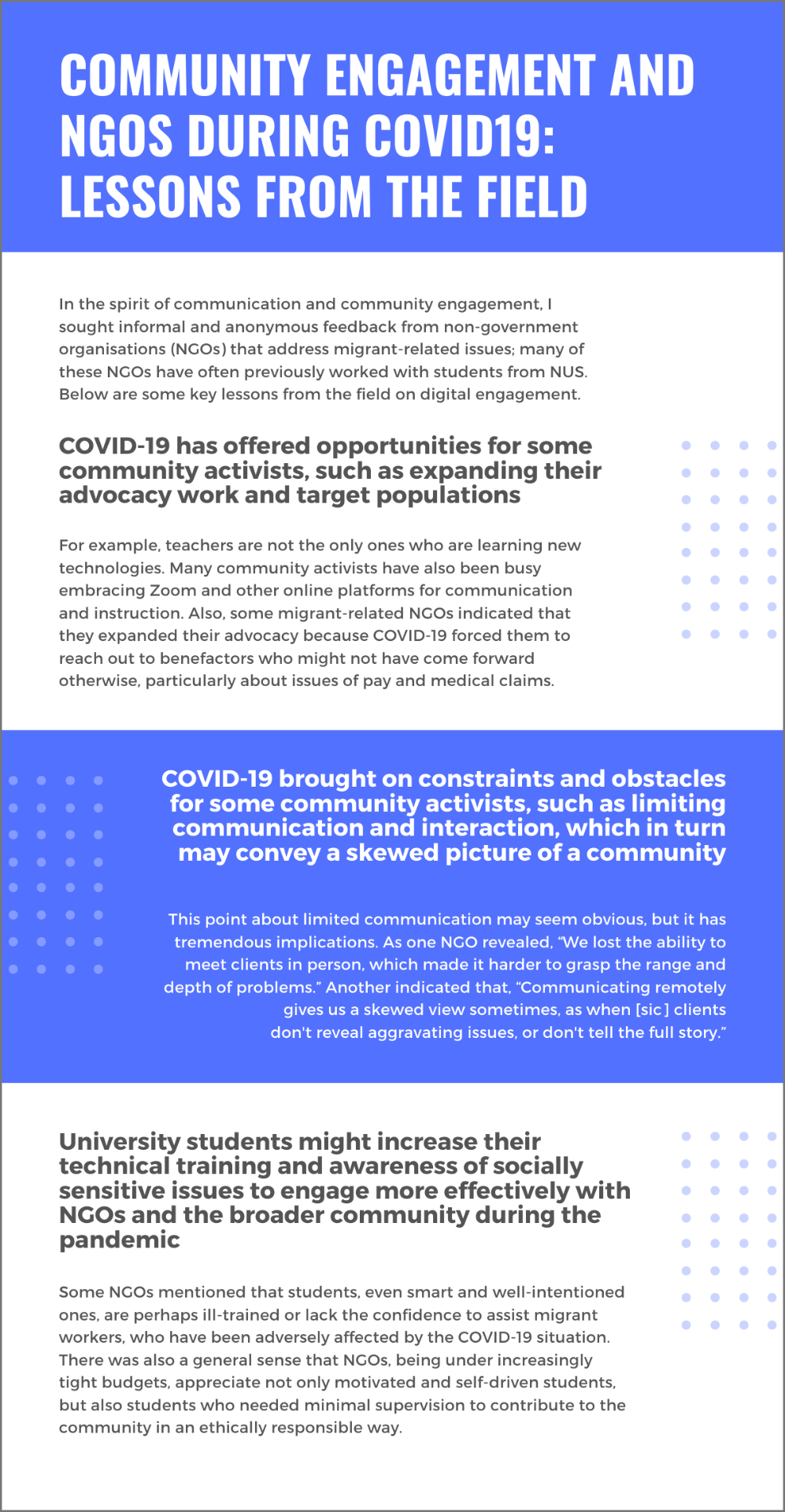Kevin McGAHAN
Department of Political Science, Faculty of Arts and Social Sciences (FASS)
College of Alice and Peter Tan (CAPT)
Kevin discusses how the challenges of COVID-19 have also provided opportunities for faculty and students to explore alternative ways of initiating community engagement and volunteer activities with their community partners.

The COVID-19 global pandemic has not only posed daunting challenges for communities, but also extraordinary opportunities to rethink entire socio-economic policies and educational ecosystems. Consequently, much is at stake for healthcare professionals, business leaders, public officials, and particularly educators to engage with the various communities that constitute society to leverage on opportunities and mitigate the risks associated with the current pandemic.
At its core, community engagement requires interaction and communication to understand how best to contribute to and benefit from certain communities, ranging from the elderly to migrant workers to persons with disabilities. However, global and national responses to COVID-19 have entailed harsh quarantines and travel restrictions, all of which have generally undermined traditional means of community engagement.
By drawing on insights from community activists as well as participant observation, I argue that educators are able to take advantage of opportunities for community engagement spurred by the COVID-19 situation, such as increasing the range of activities and the number of potential volunteers. However, these positive outcomes require careful listening to community needs, increased training and awareness, and ensuring inclusivity among participants.

Opportunities in the Offing: Working with Online Platforms for Digital Engagement
COVID-19 has pushed many educators, including myself, out of their comfort zones. During the past several months, for example, I have engaged with migrant workers, a community disproportionately affected by the COVID-19 situation (Al Jazeera, 2020; BBC, 2020), through a project called the WePals Befriender Programme. This programme essentially connects migrant workers in Singapore with locals to become online friends; the organisers monitor all communications. WePals consequently offers students and activists a transparent mechanism through which to interact with and learn from migrants, providing a safe learning environment for all parties concerned (Lin, 2020).
In reflecting on my own experience with WePals, the programme allowed me to gather original insights about the positive and negative aspects of migrant-worker life during the COVID-19 crisis. I learnt that the migrants, though worried about COVID-19, are also understandably anxious to return to work. Yet, having said that, my limited interactions also suggest that there remains a sense of humour and even normalcy among them during this rather extraordinary crisis. While my interactions underscored the concerns mentioned above, I concluded that digital engagement clearly presents great potential and opportunities. Digital engagement, for instance, is more convenient and relatively cost-effective, thereby encouraging more interaction over time with marginalised communities.
Moving Forward Together
Engaging with communities is difficult during the best of times. However, given the challenges of COVID-19, particularly in the realm of education, community engagement might seem counterproductive, even impossible. This essay clearly suggests otherwise. By listening carefully to the evolving needs among community activists, leveraging on technology, training for changing situations, and mitigating obstacles to participation, faculty and students can strengthen bonds and educate one other through community engagement.
 |
Kevin MCGAHAN is a lecturer in the Political Science Department and Global Studies Programme, where he teaches and conducts research on global migration, global governance and the politics of Southeast Asia. He also holds a joint appointment as a faculty fellow at the College of Alice and Peter Tan (CAPT). Kevin can be reached at polkm@nus.edu.sg. |
References
Al Jazeera. (2020, July 3). Locked up in Malaysia’s lockdown. Retrieved from https://www.aljazeera.com/programmes/101east/2020/07/locked-malaysia-lockdown-200702104523280.html.
BBC. (2020, April 17). Coronavirus: Singapore spike reveals scale of migrant worker infections. Retrieved from https://www.bbc.com/news/world-asia-52320289.
Lin S. (2020, June 26). Virus breaks down social barriers in Singapore. Bangkok Post. Retrieved from https://www.bangkokpost.com/opinion/opinion/1941396/virus-breaks-down-social-barriers-in-singapore.
Polco/National Research Center (NRC). (2020, July 17). Engaging the community to inform the way forward [Webinar]. Retrieved from https://www.youtube.com/watch?v=2nIHd9S57bc&feature=youtu.be.

